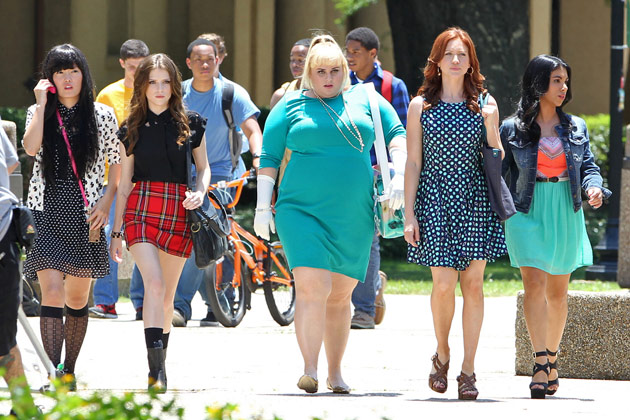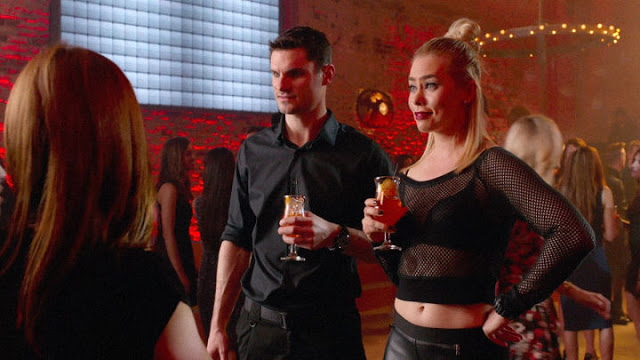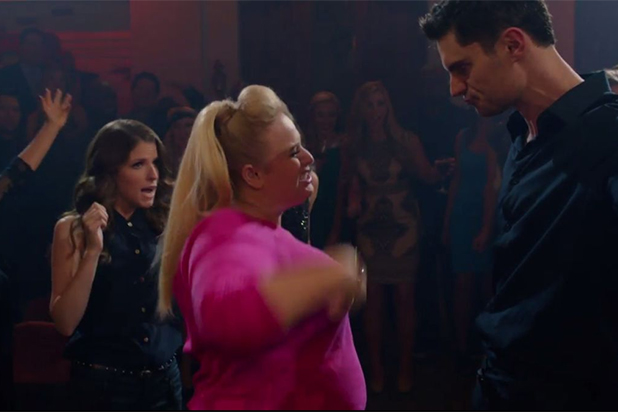The dirty little secret of Pitch Perfect is that, as delightful and refreshing as it may have been, it wasn’t a good movie. (In this, it was essentially the musical equivalent of Love Actually.) Its characters were one-dimensional, its romance was insipid, and its story was inane. Yet isolated parts of the movie—the riff-off, the “Since You Been Gone” auditions, anything involving Rebel Wilson’s Fat Amy—were so transcendently joyful that it became a classic anyway, an irresistible send-up of the sports movie transplanted to the goofy arena of competitive a cappella. It may have been familiar, but thanks to its inspired staging and tap-your-foot singing, it also felt fresh. Now, Pitch Perfect 2 attempts to repeat the first film’s formula; almost axiomatically, it is only half-successful. The unaccompanied musical numbers once again range from robustly enjoyable to deliriously fun, but the element of novelty has vanished. It’s hard for your movie to feel fresh when all of your material is recycled.
Anna Kendrick again stars as Beca, the too-cool-for-school member of the Barden Bellas who has embraced her role as the group’s primary arranger, even as she’s also covertly pursuing her dream of becoming a music producer via an internship at a record studio. She’s still dating Jesse (Skylar Astin), and to the movie’s credit, it doesn’t manufacture any lame complications between the two lovebirds and instead just shunts Beca’s bland boyfriend to the sidelines. (Astin does get to show off his vocal chops in an early scene.) That makes room for a far more interesting romantic pairing: Fat Amy (Wilson remains the franchise’s strongest asset, which is saying something, given that Anna Kendrick is involved) and Bumper (Adam DeVine), the buffoonish villain of the original who is now both pathetic and strangely endearing. Their love story is extravagantly goofy and commensurately enjoyable; there’s a funny scene in which Bumper feebly attempts to court his intended via forced grownup talk (“So, there’s a war, and also, the economy.”), but it’s dwarfed by the sight of Fat Amy subsequently serenading him with Pat Benatar’s “We Belong” while standing in a rowboat.
That’s a high note for Pitch Perfect 2, in terms of both comedy and character. The movie is considerably less generous in filling out the remainder of the Bellas’ ensemble; each of the supporting singers conforms to a specific trait and exhibits only as much personality as is necessary to establish that trait. And so, there are Chloe (Brittany Snow), the uptight leader; Stacie (Alexis Knapp), the sexpot; Lilly (Hana Mae Lee), the nutcase; Cynthia Rose (Ester Dean), the lesbian; and Flo (Chrissie Fit), the Mexican. This muddled mix of sopranos and altos is variable in their humor—Lilly’s sudden bursts of whispered insanity are suitably bizarre, whereas Flo’s caricature of an immigrant strains for provocative laughs but settles for mere vulgarity—but they lack sufficient definition to come off as anything more than backup singers. (In self-aware recognition, the sequel continues the amusing runner regarding Jessica and Ashley, two Bellas who are so anonymous that even they are unsure who is who.) Most disappointing is Emily (Hailee Steinfeld, gradually squandering the goodwill she generated from her debut performance in True Grit), the new girl, whose arc from wide-eyed freshman to self-assured sorority sister feels like a thinly sketched parody, without any color or detail.
This is all a mild drag, but it’s also entirely trivial. The reason to see Pitch Perfect 2 is the same reason Pitch Perfect became such a smash in the first place: the songs. It is simply impossible not to get swept up in the enthusiasm that the cast brings to its showstopping a cappella covers of radio hits, which the actress Elizabeth Banks, now in the director’s chair, choreographs with aplomb. She also provides the Bellas with an appropriately hammy antagonist in the form of Das Sound Machine, a massive, Rammstein-like ensemble led by Kommissar (Borgen‘s Birgitte Hjort Sørensen, soon to appear on Game of Thrones) and Pieter (Flula Borg). Das Sound Machine turn a cappella into blood sport; their ferocious rendition of Muse’s “Uprising” is the most intimidating rhythmic German performance this side of goose-stepping.
The plot—yes, there’s technically a plot—involves the Bellas’ attempts to reclaim their dignity after Fat Amy inadvertently flashes President Obama during a performance at the Kennedy Center. (If I had to distill the movie’s comedic ethos down to one word, it would undoubtedly be “vagina”.) This requires them to compete against Das Sound Machine in the world championships, with a number of entertaining side gigs along the way. The most memorable of these is a sort of Jock Jams battle at the decked-out basement of an absurd playboy (David Cross). It’s a shameless rip-off of the first film’s riff-off, but it’s a blast anyway, and it has the added benefit of two new competing groups: a foursome of old-school troubadours (composed of scene-stealing comedians John Hodgman, Jason Jones, Joe Lo Truglio, and Reggie Watts), and a quintet consisting of—aca-believe it—Clay Matthews and four other members of the Green Bay Packers. The sequence also features Fat Amy delivering a high-stepping performance of A Tribe Called Quest’s “Scenario” that is so infectious, you’ll struggle to stay in your seat.
Still, as intermittently charming as Pitch Perfect 2 may be, something about it bothers me, something beyond its lackluster approach to storytelling (which could only be expected). More problematic is this: It isn’t very funny. Sure, there are a handful of laugh-out-loud moments; at one point, Fat Amy literally rubs her confidence onto Beca, and a late sojourn at a retreat benefits from the return of Anna Camp, who provides a bolt of anarchic energy. But most of the purported humor is either lazy (note to Banks: foreign accents, by themselves, are not intrinsically hilarious—the characters need to actually say something funny) or weirdly lacking in payoff (Beca’s self-professed sexual confusion regarding Kommissar’s Aryan beauty seems funny, until you realize it’s a one-note gag that’s running in place). Banks herself reprises her role as Gail, the straight half of a commentary team who regularly rolls her eyes opposite John Michael Higgins’s gleefully misogynistic John—it’s a theoretically appealing pairing whose presence nevertheless wears thin. It’s as if Banks simply plotted the movie around its soundtrack and then just expected her cast to fill in the blanks in the script with zingers. Unfortunately, unlike covers of classic songs, good jokes don’t write themselves.
Midway through Pitch Perfect 2, Beca’s boss at the studio (a predictably amusing Keegan Michael-Key) lectures her about the staleness of mash-ups and the vitality of producing something new. He isn’t being ironic, but perhaps screenwriter Kay Cannon is, because there is nothing original about this formulaic movie. It conforms to the first film’s blueprint with scrupulous fidelity, mixing undeniable musical savvy with scattershot humor and bland writing. It’s understandable that Banks didn’t want to switch up what worked, but that timidity proves to be the defining quality of this semi-satisfying sequel. It pretends that it’s outrageous, when it’s really just thoroughly safe.
Jeremy Beck is the editor-in-chief of MovieManifesto. He watches more movies and television than he probably should.



